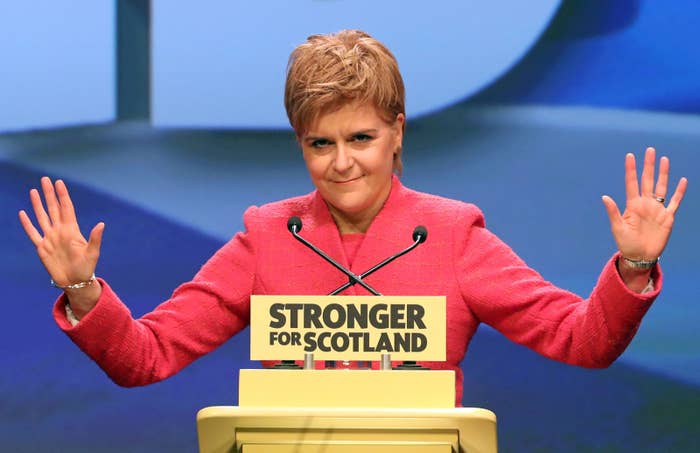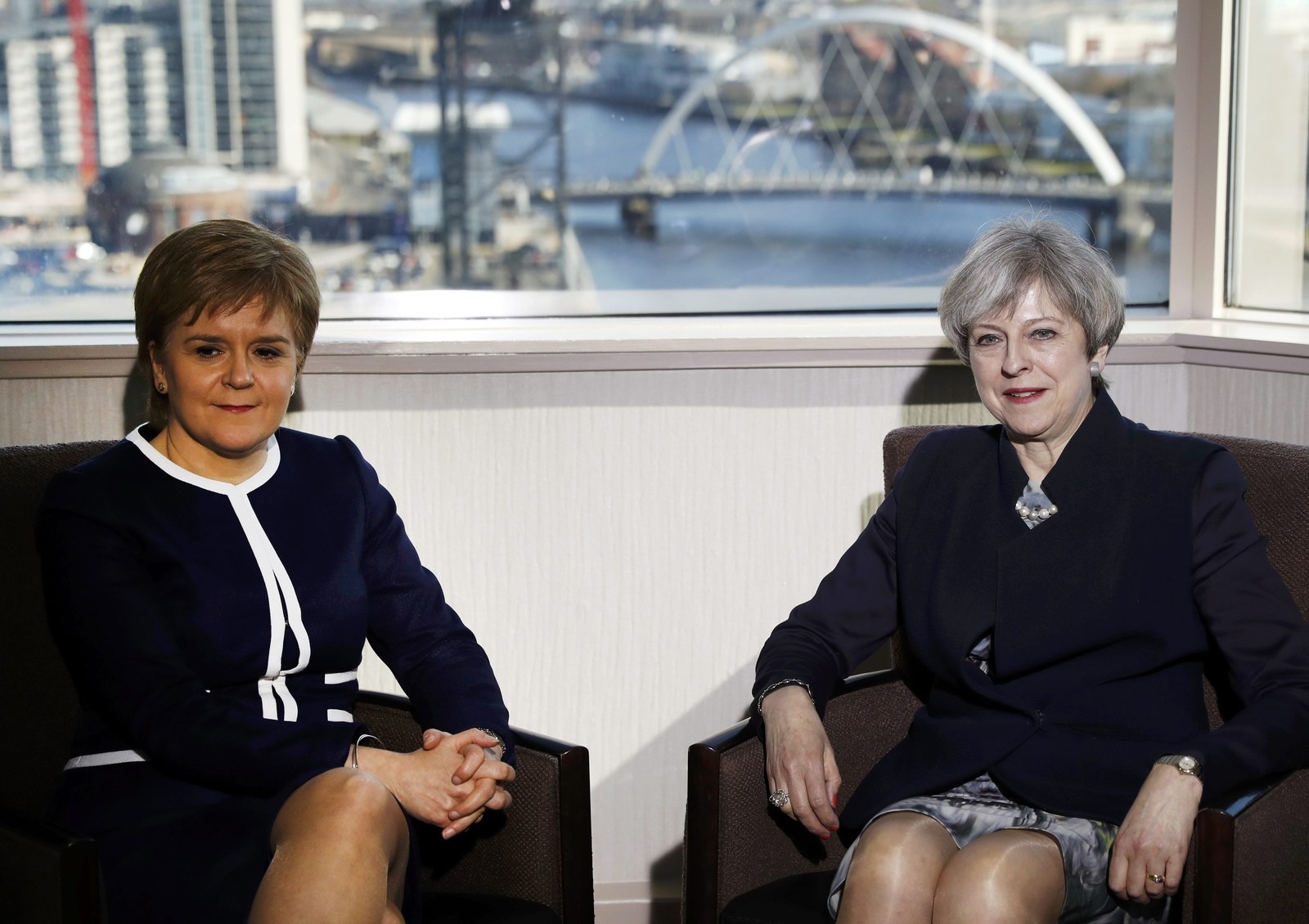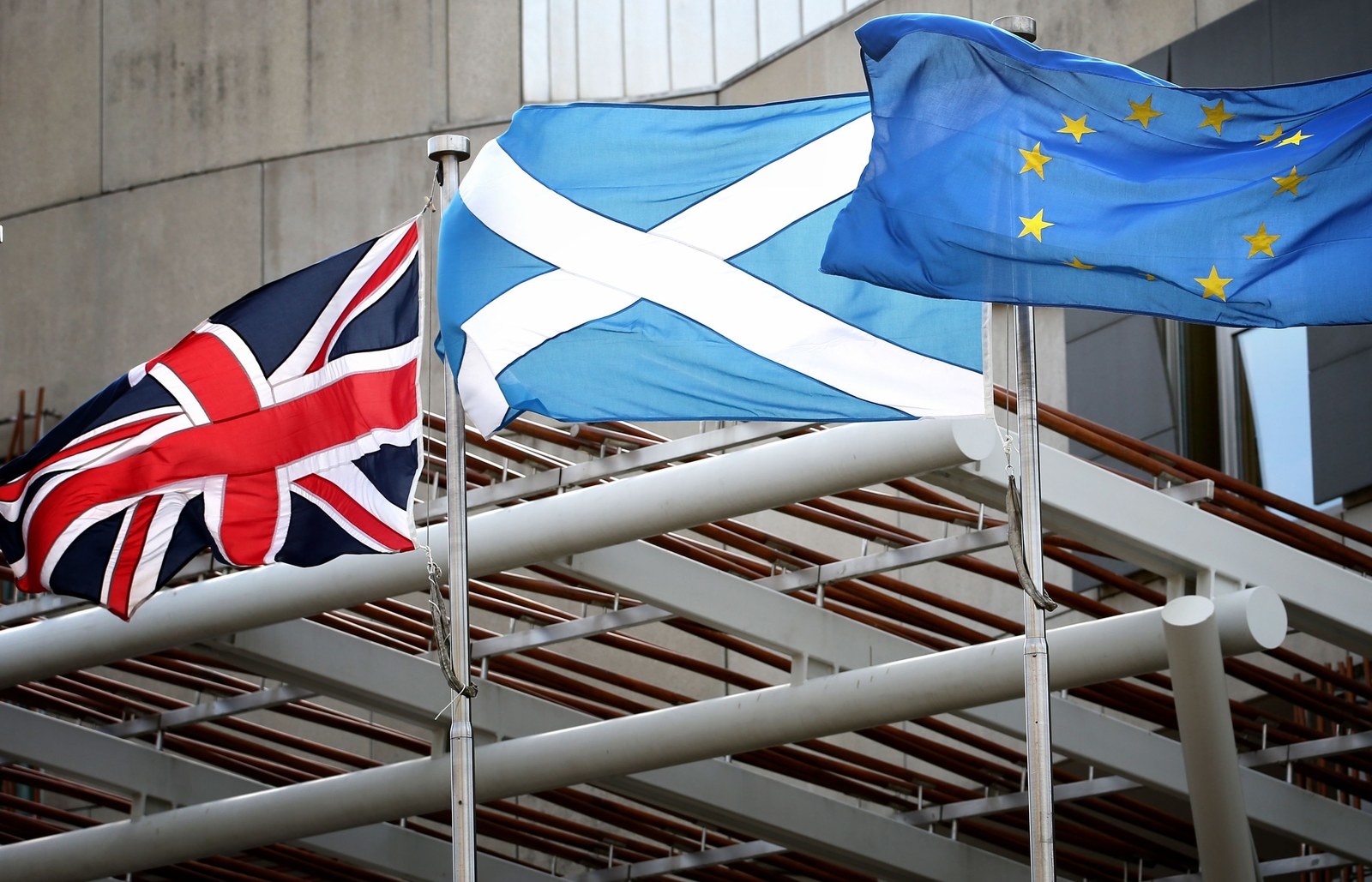
The pro-independence side in the next Scottish referendum will lay bare the risks of an independent Scotland as well as the opportunities, prominent Yes campaigners from the last referendum have told BuzzFeed News.
According to the campaigners, the Yes side will present an independent Scotland as the lesser of two risks in the face of a hard Brexit, and detail how to turn around the "mess" that would be inherited from the UK.
The campaigners expect the SNP to stop "banging on about Norway" and other oil-rich countries and focus on making a clear case for eliminating Scotland's deficit over the next 10 years – rather than promising a "land of milk and honey".
There's disagreement in the party over whether a Yes vote should automatically lead to EU membership, with one former Scottish government minister telling BuzzFeed News the SNP will lose if this is part of the Yes offer.
On Tuesday, the Scottish parliament backed first minister Nicola Sturgeon's proposal to hold another independence referendum by spring 2019, but prime minister Theresa May has said "now is not the time" for a vote.
Alex Neil MSP – the Scottish government's social justice secretary until last year – admitted the economic case for independence is "superficially weaker" than it was in the last independence referendum due to the fall in oil price.
But he added he expects the Yes side to build a new case based on what Scotland could do to make itself one of the "top 10 richest countries in the world" within 10 years of being independent, as opposed to being part of the UK outside of the EU.
"We need to map out exactly what we would do," said Neil. "There’s no doubt we would inherit a mess but we can turn that round much quicker than people think. We have to contrast what we could do in an independent Scotland ... compared to the prospect of living under a British Tory regime."

Toni Giugliano, a member of the SNP's powerful national executive committee, told BuzzFeed News that he expects the issue of North Sea oil to have a minimal role in the next independence campaign and that it will instead focus on other economic areas and the "democratic deficit" made clear by the EU referendum.
The SNP has faced severe criticism since the 2014 independence referendum after its estimates for oil revenue in the first five years of independence turned out to be too optimistic by what is expected to be around £30 billion.
Giugliano said the party will produce a new "white paper" on how an independent Scotland would work, including how it'd increase its tax base and encourage businesses from England, for whom the European single market is important, to relocate.
"We need to get the economic case spot-on," said Giugliano. "The case must be one that says we have a deficit – no country is a land of milk and honey – but we have a tax base and we can expand that through our membership of the single market.
"If we have a solid plan in place to do that then North Sea oil will just be a cherry on the cake – we can't rely on it and I’m insisting we stop banging on about Norway. Finland, Austria, and other countries of a similar size don’t have North Sea oil and are the kind of countries we want to aspire to."
Blair Jenkins, the chief executive of the official Yes Scotland campaign in 2014, agreed that the pro-independence side lost last time largely due to a failure to convince Scots that the economics of independence stacked up.
Sturgeon has established a task force to build the economic case for independence, headed by former SNP MSP Andrew Wilson, and Jenkins believes the quality of that work will decide the next referendum – particularly on issues such as currency and winning over Scotland's senior citizens.
"I think the economic case last time was the main stumbling block in trying to get people to move to Yes – it was undoubtedly the main thing," said Jenkins. "I think a good case was put forward, but clearly it wasn’t enough for enough people.
"It has to be significantly strengthened and that’s what Andrew Wilson and his group are working on. But I think a lot of people are coming to the conclusion that Brexit will be more of an economic risk than independence."
Wilson has been coy about the details of his commission's report – which is due to be released in the coming weeks – but said earlier this month that the work will assume oil will produce zero revenues in future.
A significant issue that remains unclear is what currency the Scotland will use if it leaves the UK – although senior SNP sources have said the "consensus" among the party appears to be for a so-called "Scottish pound", which would be pegged to the pound sterling.

What is also as yet undecided is to what extent a Yes vote in the next independence referendum would act as a mandate to allow the Scottish government, should it win independence, to then go ahead and apply for Scotland's EU membership.
While Scotland's vote to remain in the EU last June is being used as the justification for holding another referendum, there have been reports that Sturgeon initially favours joining the European single market and then the EU at a later date.
Neil, the only SNP MSP to admit to voting Leave, said he believes the SNP would lose another referendum if it was based around EU membership, and urged Sturgeon to hold an EU referendum after Scotland becomes independent.
Asked if he would definitely vote Yes in an EU-focused Scottish referendum, he said: "I don’t think that’s going to arise. I’m convinced the two issues will be kept separate and I never answer questions which won’t arise.
"I’m totally, 110% committed to independence but the issue of European Union membership, if we tie the two things together, we won’t win in my view. We’ve got to keep the two issues separate."
Neil added that there’s a "significant proportion" of people who voted Yes last time who might not vote for independence if it means automatically going back into the EU when Scotland becomes independent.
He went on: "There’s also reluctant Remain voters, many of whom are not particularly pro-EU but voted Remain because they thought it would lead to an independence referendum. In a referendum on if Scotland should join the EU, they’d almost certainly vote No."
Since the referendum, senior SNP sources have admitted they don't yet know if people who voted Leave in the EU referendum but Yes in the Scottish referendum would vote Yes again if the question was tied to EU membership.
But Giugliano said he doesn't foresee those who voted Yes and Leave abandoning independence in the next referendum, saying: "Alex Neil and others are making a loud noise and if you ask them if they’d like to be in the EU they'll say no.
"But would they put a cross on Tory rule over independence at the next referendum? I don’t believe it. I refuse to believe it. When the time comes, people will realise there’s something bigger at stake."
Jenkins said the European issue will become clearer after the UK government triggers Article 50 this week, after which he believes European governments will feel "much more comfortable" discussing Scotland as the UK will officially be an exiting state.

Asked what he expected to be different about the next campaign from the one in 2014, Giugliano said the tone of the referendum might have more "bite" due to what the Yes side perceives as false promises that were made last time round.
It is understood the Yes campaign, inevitably to be led by Nicola Sturgeon, is unlikely retain the Yes Scotland name from 2014 because the SNP wants to make this a fresh campaign rather than a rerun of the last one.
"I do want a positive campaign, but the truth is when you look at campaigns across the world it’s often not positive campaigns that win," said Giugliano. "While I do want our campaign to be positive, I want it to have teeth, and bite where it needs to bite."
Asked the same question, Jenkins said the main difference between the two campaigns is that Yes will now be able to present itself as the safe and more familiar option as opposed to an uncertain future in a UK outside of the EU.
"What has clearly changed is in 2014, Yes was the change option," he said. "You could say in 2014 the fresh risk was on the Yes side – not this time."
